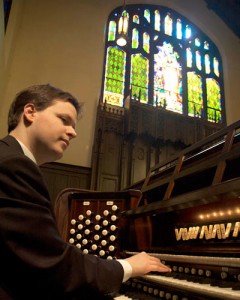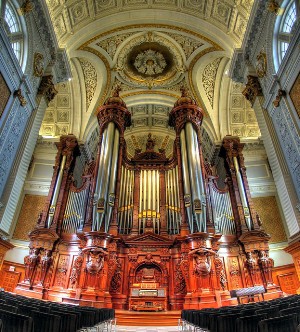Classical Music: Organist Paul Jacobs Dazzles
There is no doubt that Paul Jacobs, playing the whole recital from memory, is a phenomenal artist, as the advance word had indicated.
By Caldwell Titcomb.
For the last several years, there has been incredible buzz around the globe concerning a young organist named Paul Jacobs. As one who played a public pipe organ recital at the age of 16, I have been eager to hear what all the shouting has been about. My desire was fulfilled on October 22 when the Methuen Memorial Music Hall sponsored Jacobs in the Berj Zamkochian Memorial Recital. Zamkochian (1929–2004) was, among other things, the official organist of the Boston Symphony Orchestra, with which he made several classic recordings.
Jacobs’s background is just amazing. Born in 1977, he started on the piano at six and took up the organ at 13. By 15 he had a job as church organist. He received his B.M.degree from the Curtis Institute and proceeded to an M.M. degree and an Artist Diploma at Yale. In 2003 he joined the faculty of the Juilliard School, and the following year he was named the head of its organ department. In 2007 he was awarded the William Schuman Chair.
He is known to have committed to memory the entire organ works of Bach and Messiaen. On the 250th anniversary of Bach’s death, when Jacobs was 23, he played Bach’s complete organ output in an 18-hour, non-stop concert. On several occasions, he has performed all of Messiaen’s organ music in nine-hour marathon concerts.
Methuen brought him in contact with one of the great concert organs. The instrument was completed in 1863 by the E. F. Walcker firm in Germany and installed as the first U.S. concert organ in the Boston Music Hall. It was later purchased and moved to Methuen, where Edward Searles engaged English architect Henry Vaughan to erect an imposing building whose sole purpose was to house the organ. In 1947 a Boston firm renovated the organ, which today has four keyboards, 85 stops, and more than 6,000 pipes.
Jacobs completely changed the music in the printed program’s first half and spoke briefly about the pieces. Instead of Bach’s early Prelude and Fugue in A-minor (BWV 543), he began with the grandiose “St. Anne Prelude” and Fugue in E-flat Major (BWV 552), dating from 1739. The work is based on a chorale tune (1708) by William Croft, best known to us as the hymn “Our God, Our Help in Ages Past.” Jacobs wonderfully captured the bouncy rhythms of the prelude; the fugue began softly and built to a glorious climax.
The program then listed a 1912 Prelude by Nadia Boulanger (1887–1979). I should like to have heard this piece—one of her few compositions before she stopped writing out of deference to what she considered the greater talent of her younger sister Lili. Nadia (who was herself an organist) went on to become the most influential composition teacher of the preceding century—whose many American students included Aaron Copland, Virgil Thompson, Roy Harris, David Diamond, Noël Lee, and local composers Arthur Berger, Harold Shapero, and Irving Fine. Instead of the Prelude, Jacobs substituted three of the four short duets from the same Bach collection as the “St. Anne.”
The listed Max Reger D-minor Sonata (1901) I don’t regret losing, since I am not an admirer of his music. Jacobs replaced it with the first of Mendelssohn’s six important sonatas completed in 1845. This work, in F-minor, has four movements and requires considerable virtuosity that Jacobs easily met. The third movement flows without break into a toccata-like, F-major finale.
After intermission Jacobs stuck to the announced music: Franz Liszt’s Fantasy and Fugue on the Chorale “Ad nos, ad salutarem undam” (1850). The chorale was taken from Meyerbeer’s opera Le Prophète (1849). This is a huge work, running a half hour. The use of the term Fantasy affords great freedom, but it still lacks coherence. The demands on the player are enormous, and Jacobs, having taken off his black jacket, took care to exploit a wide variety of colors from the instrument.
There is no doubt that Jacobs, playing the whole recital from memory, is a phenomenal artist, as the advance word had indicated. The large Methuen audience gave him an ecstatic standing ovation. And Jacobs acknowledged the reception with a short D-major piece by Bach. Before the Liszt, Jacobs urged the audience, when pleased by something, to “share your enthusiasm.” That’s exactly what I am trying to do here.
Tagged: Caldwell-Titcomb, Classical Music, Methuen Memorial Hall, organ


